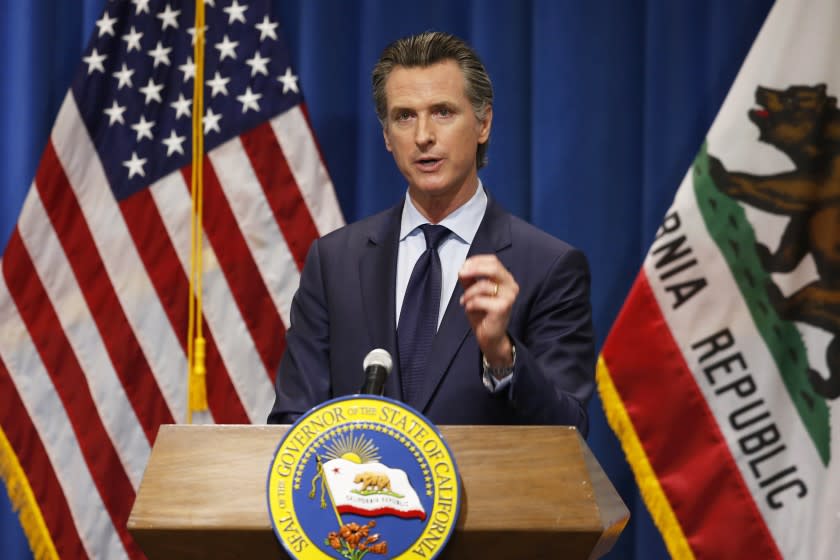Editorial: Time to cut off Gov. Newsom's blank check

In mid-March, the California Legislature took the extraordinary step of going into recess at a key point in the session and heading home indefinitely to stop the spread of the coronavirus among lawmakers and staff. Before they left the Capitol, however, legislators agreed to give Gov. Gavin Newsom unrestricted access to $1.1 billion from the state's budget to use as he saw fit to respond to the crisis that was just beginning to unfold.
This act of faith was the right decision for the moment. Legislators might have been stuck at home, but the governor spent his days in the state's emergency operations center, in the middle of a fast-moving disaster. He needed the ability to move quickly to ensure that hospitals, first responders and public health departments had the resources necessary to meet the anticipated surge of COVID-19 cases.
There was some grumbling later about the governor's lackadaisical efforts to keep legislative leaders informed of what he was up to, but his results made those quibbles seem inconsequential. Coronavirus cases didn't overwhelm the healthcare system as many had feared, in large part due to the governor's quick action. In recent weeks, both hospitalizations and new confirmed cases have been decreasing to the point that businesses are reopening across the state and Californians are going back to work. The Legislature is back in session as well. The crazy days of the emerging crisis are settling into a more methodical approach to managing the pandemic.
But the governor seems to have missed that shift. In his newly revised budget proposal, Newsom is requesting access to $2.9 billion more in emergency COVID-19 funds that would be exempt from the normal legislative oversight. During a hearing Monday, Senate Budget Committee Chairwoman Holly Mitchell (D-Los Angeles) questioned why the governor needed access to so much money with no strings attached now that the Legislature was back on the job. The nonpartisan Legislative Analyst's Office raised concerns too about the degree of budgetary autonomy being requested by the governor, warning that legislators should guard against ceding any of their constitutional authority. We agree.
This is not to say we don't trust Newsom. We do, even though some of his pandemic deals raised a number of questions. California is fortunate to have a leader who has wielded the vast power granted to him by the state's Emergency Services Act with wisdom and judiciousness. The results of his leadership have been fewer deaths than probably would have occurred had he not had the ability to quickly issue executive orders and to spend money.
But now that the state is moving from the emergency response phase into one of recovery, the governor needs to start sharing power again with the Legislature, as the state's constitution intends. That means no more COVID-19 blank checks. Assembly and Senate leaders must insist on maintaining their oversight role in COVID-19 spending in the next fiscal year. The only exception would be if another coronavirus wave happens after the Legislature adjourns for the year, at which point it may be appropriate to free up some emergency funds.
The Legislature has legal authority to terminate the governor's emergency powers immediately through a vote in both houses. Two Republican lawmakers are calling on their colleagues to do so, arguing that Newsom has exceeded his authority. We don’t agree that he has, or that it's time to declare the coronavirus emergency over. Despite the positive trend in hospitalizations and cases, we’re still in the middle of a crisis, and the governor still needs to be able to act rapidly through executive orders to, say, suspend laws or commandeer resources, should COVID-19 cases suddenly spike.
That said, we don't like the idea of open-ended emergency declarations and would prefer to see some restrictions in place for the next pandemic or natural disaster. Some states' emergency power laws automatically terminate the governor's authority in 30 or 60 days unless an extension is approved by the Legislature. That seems like a reasonable middle ground. We were fortunate to have a governor making smart use of his power in this crisis, but that may not always be the case.

